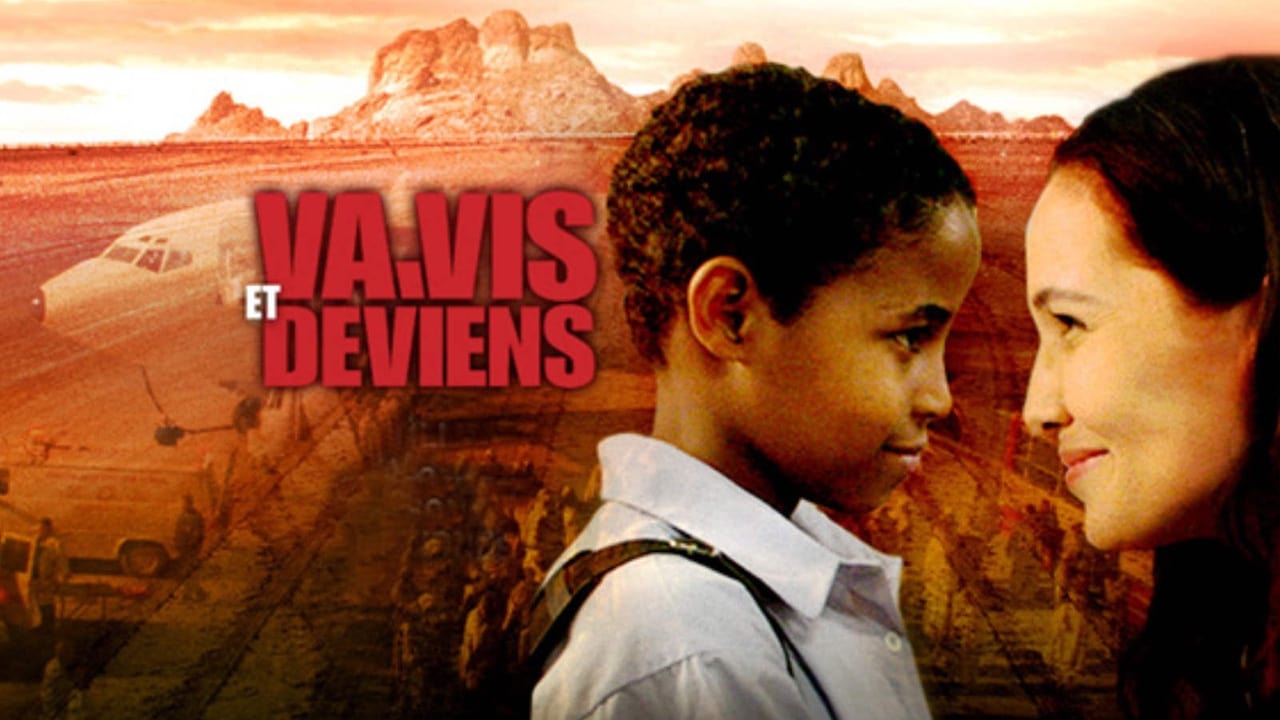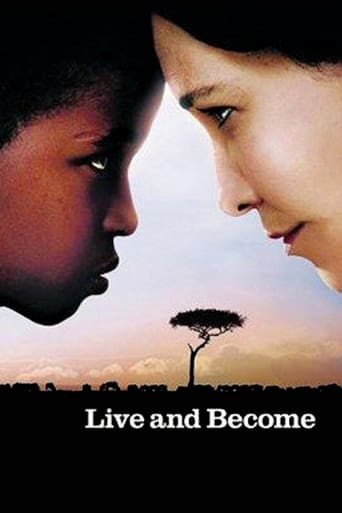

Va, vis et deviens is a film that touched me deeply. Radu Mihaileanu shows us, once again, his great sensibility and his genius for telling emotional and profound stories while denouncing injustices, racism, hunger and poverty. Schlomo's story makes us think about intolerance, racism, motherhood, unconditional love and religion. This is an essential movie for all of those who feel strangers no matter where they are. Schlomo's story was written by Radu Mihaileanu, but it is based on thousands of personal stories of Ethiopian Jews who emigrated to Israel in 1984 under the so-called "Moses Operation".Va, vis et deviens won several awards (Berlinale: 3 awards; Copenhagen International Film, and the César award for Best Original Screenplay –Meilleur scénario original–). It was the first film dealing with the immigration of the Ethiopian Jews to Israel. The movie is in Amharic, Hebrew and French.The best: Radu Mihaileanu's sensibility, the 3 Schlomos (Moshe Agazai, Moshe Abebe and Sirak M. Sabahat), the music (Armand Amar), and the Qes Amhra (Yitzhak Edagr).The worst: some small over-dramatic moments.
... View MoreLive and Become is is about never giving up, no matter what! It's an optimistic story. When you do good in your life, good comes back to you when you least expect it.Parts of this story are incredibly gut-wrenching, I even had to fast forward the movie, at times. Vicariously experiencing the incredible suffering taking place in a refugee camp was unbearable. On the other hand, we get to see a relatively normal Middle Class existence through most of the story, which is quite a relief! While this is a fictional story the setting is 100% historically accurate. I felt like I was reliving the news from the 1980's! I remember the Falashas, also known as Ethiopian Jews and their evacuation from Ethiopia and the Sudan. I also remember what a hard time they were given by a large segment of the Israeli population, especially by the Ultra Orthodox religious establishment who did not consider them to be real Jews.The racism and constant humiliation experienced by Schlomo was mind-numbing, and symbolic of how the Falashas were actually treated back then. What a very sad commentary on the Israeli society of the time! I immensely enjoyed getting to see Schlomo played by 3 different actors: one as 9-year old, then as a teenager and finally as a man in his 20's. We literally get to see Schlomo turn into this incredibly brave and self-confident man. What a moving story! After watching it, I guarantee you it will strengthen your belief in a Supreme Being!
... View MoreThe writer and director of this utterly amazing and gut-wrenching film is the Romanian Jewish emigré to Paris, Radu Mihaileanu (born 1958). Every shot, every detail, every performance, and all the dialogue, is completely and totally brilliant. That perfection, plus Mihaileanu's impassioned fury, is what gives this film its unique power. The film contains many unknown actors and actresses who have never appeared in anything before or since, and they are often the most effective people in the film, under the director's sure and sympathetic hand. The film deals with the strange story of the people known as the 'Falashas'. People in the West who are old enough to remember the news stories of 1980 may dimly recall the incidents, as they were so bizarre as to seem almost incredible at the time. The Falashas certainly made front page news for weeks. The Falashas are the so-called 'black Jews' of Ethiopia. They had lived for perhaps 2,000 years or more as a tiny minority in Ethiopia, and they are of Ethiopian blood. But instead of being Christians like the majority of Ethiopians, they are Jews. No one knows how or why they became Jews or what their original story really is. Then one day the Israeli Government decided to rescue them from the oppressive Mengistu Regime which existed in Ethiopia in 1980 (Mengistu was a fanatical communist of the Stalinist persuasion, and a psychopathic mass murderer). The Israelis wanted to airlift all of the Falashas and take them to Israel! But this had to be done in total secrecy. Also, the Israelis could not land their aircraft in Ethiopia, so the Falashas had to make their own way on foot to the Sudan, from where they would be collected from a giant refugee camp which existed there. So 12,000 Falashas set out for the Sudan in a vast and tattered migration, 4,000 of them dying on the way. Only 8,000 reached their destination more than 1,000 miles away, dehydrated, starving, ill, and exhausted, and many of them dying. The story of the film commences in the camp, when a Falasha woman holds her very young son dead in her arms and realizes that she has lost everything; she herself is also dying. Meanwhile, an Ethiopian Christian woman and her son of the same age are also in the same part of the camp, but they are still healthy. The Christian woman pretends that her son is the dead boy so that he can be evacuated as a Jew, and the Falasha woman decides to help him and agrees to the deception. The Israelis come and are fanatical about screening out the Christians and will only take Jews, so they interview them mercilessly. The boy has been told to say he is called Solomon ('Schlomo' in Israel), his father is Isaac, he is told the village name, etc., to convinced the Israelis. But he does not want to go and leave his mother, whom he loves above all else. She turns harsh with him and pushes him away and says: 'Go, live and become! And only after you have become, then come back to me!' They are both heart-broken. Both the Ethiopian women are amazing, overwhelmingly effective despite being non-professionals. So the boy is swept up in the evacuation and gets through the Israeli screening process. He and a plane-load of Falashas land in Tell Aviv, dazed and totally confused. They are kept in isolation for months and repeatedly screened. And that is only the beginning of the long and emotional story. The little boy is brilliantly portrayed by a genuine Falashsa boy named Mosche Agazai, and equally brilliantly played as an adolescent by another real Falasha, Moshe Abebe. Because 'Schlomo' has been so upset, he had become unruly and so a left-wing Israeli couple with two children of their own adopt him, and he moves into an affluent suburban house. His adoptive mother is wonderfully portrayed by an experienced and sensitive Israeli actress named Yaël Abecassis. The boy befriends a wise old Falasha, whose family all died, played by Yitzhak Edgar. And finally, Schlomo as an adult is portrayed by Sirak M. Sabahat. The remarkable thing is that none of the people I have mentioned apart from the Israeli actress has acted in any other film, and yet they all did better than any professional cast could conceivably have done. The intensity of their performances is searing and never to be forgotten. This film is a great classic, which should be entered in the annals of world cinema as one of the most moving films ever made. The film is also a massive indictment of hypocrisy and intolerance, as experienced in Israel by the Falashas after their arrival. They were abused, insulted, and subjected to a bombardment of hate and prejudice of incredible proportions, and this is graphically shown in the story. As an adolescent and adult, Schlomo is loved by a white Israeli girl named Sara, beautifully and sensitively portrayed by the young Roni Hadar (who has gone on subsequently to appear on TV and in another film). Her father is a violent bigot who thinks the Faslashas are sub-human, and the irony of Jews classifying other people as 'untermenschen' is not lost on us! Every aspect of this tale is anguished, and so much of it is heart-rendingly tragic. Some of it turns out well, however. Schlomo grows up to be a medical doctor and despite the alienation from his adoptive father, retains the devoted love of his adoptive mother.The talent of Mihaileanu is best of all shown in one of the most breathtakingly brilliant final shots ever to be seen in any film, though of course I am not permitted to describe it here. Radu Mihaileanu is certainly a cinematic genius of the first rank, and he has proved it again in his equally amazing film, THE CONCERT (2009, see my review).
... View MoreTo Whom It May Concern: I was very moved by Live and Become. I am happy a film like this has been made, especially because it allows non-Ethiopian Israelis and non-Israeli Jews to get a glimpse into the reality of an Ethiopian immigrant's experience.Despite the wonderful qualities of Live and Become, I feel compelled to voice a complaint about the film. A film like this has great power it has won countless awards and been viewed by millions of people around the world. The film presents itself as being factual and contemporary. For these reasons, I feel that you have a moral obligation to maintain your 'factual' and 'contemporary' agenda across the board both for the Ethiopian experience as well as for Israel the state. You can be fictional or accurate with both or neither, but you can't pass yourself off as being true to the one, and be completely inaccurate with the other.Examples: 1) As the Ethiopian immigrants enter Israel, someone says "All the Jews in Israel are white". Including a line like this in your film makes you morally culpable in reinforcing false stereotypes about Israel. Israel has enough unjust PR against it, framing the conflict as the "colonizing white Europeans" versus the "dark-skinned, indigenous Palestinians", which makes it all too easy for the uneducated majority to take a side. If you have an opportunity to factually educate the public, why did you choose instead to maintain ignorance? Over 30% of Israelis, throughout history, have been born and raised in the Middle East (Israel and surrounding Arab countries), the Mediterranean, and Africa. Nobody talks about that fact.2) In the scene where Schlomo asks his grandfather about a just solution to the conflict, I understand your intent is to portray the French family as liberal and left-wing. But there are ways to portray those political views without again reinforcing gravely mistaken misunderstandings about the Arab-Israeli conflict. The comparison of a newly planted tree to Israel and an old tree to Palestine is outrageous Jews have been living in the land of Israel, continuously, for over two thousand years. Unfortunately, more people these days watch movies than read books. So the audience you've reached with your film will more likely base their opinion on the Arab-Israeli conflict from the message you've presented, rather than doing their own research on Jewish presence in the land of Israel over history. For this reason, you are guilty of furthering misinformation and hostility against Israel you have rejected, rather than seized, an opportunity to help the peace process.Given the very factual, and very contemporary, suffering of both Israelis and Palestinians, you have committed a grave mis-service to everyone involved with your misleading messages. The least you could do is remedy these scenes, and make a public statement recognizing the true constitution of Israel's population and history in the land.
... View More